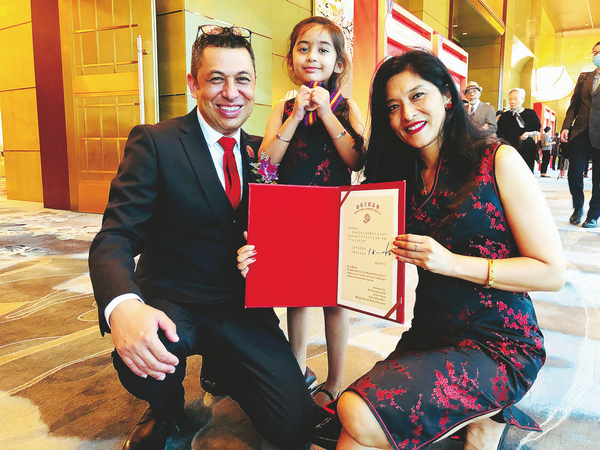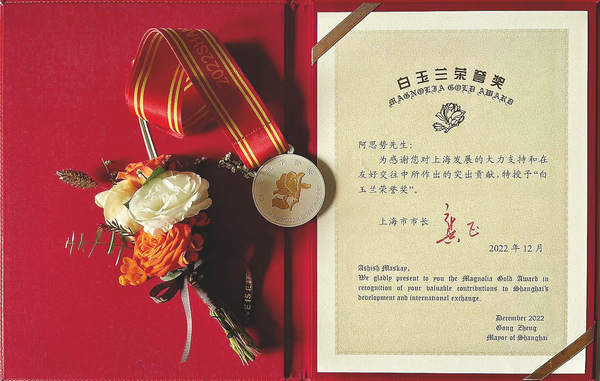Nepalese doctor reflects on city's ever-evolving tapestry
Surgeon's journey leads to contributions that are appreciated and recognized with prestigious awards


Walking through the People's City exhibition at the Shanghai Exhibition Center, Ashish Maskay feels a profound connection. Among the 900 photographs and 353 real-world examples showcasing the city's recent progress in serving its people, he witnessed not just Shanghai's transformation over the past five years but a reflection of his own journey.
Born in 1971 and arriving in Shanghai in 2003 as a young surgeon from Nepal, he navigated the city with a red Chinese-English dictionary in hand, marveling at the towering Jinmao building, one of the few skyscrapers gracing the skyline at that time.
"The 2003 China and 2024 China are very different," he reflects.
Today, Maskay is the director of Shanghai expatriate healthcare and section chief of assistant surgeons at Shanghai United Family Hospital. His journey, however, has extended far beyond the surgery room. He's also the founder of Bloodline, a nonprofit connecting expats with children battling blood cancer, a testament to the community he found in Shanghai.
His dedication was recognized in 2020 and 2022 when he was awarded the Shanghai Magnolia Silver Award and Shanghai Magnolia Gold Award, respectively, recognizing his significant contributions to the city's development and international exchanges.
Shanghai began awarding the Magnolia Silver Award to expats in 1989, later introducing the Magnolia Gold Award in 1992 and Honorary Citizenship in 1997. Over the past 35 years, 1,877 foreigners have received these honors, underscoring the city's appreciation for their contributions.
Maskay's story is interwoven with the city's evolution.
He recounts early struggles — navigating unfamiliar streets, the lack of English signage and the then uncommon sight of a foreigner, especially in outlying districts.
"They were so fascinated to see foreigners," he laughs, recalling children chasing him and his friend, shouting "Look, laowai!".
But alongside these challenges, he found kindness, a willingness to bridge the language gap with a smile and a helping hand. "My teachers and other Chinese friends, colleagues and so on, were extremely good to me," he recalls.

This spirit of helpfulness fueled his desire to contribute. The creation of Bloodline, sparked by a critical need for a rare blood type for a French girl, epitomizes his philosophy: "When Shanghai cries, I cry. When Shanghai smiles, I smile." He sees the organization, with its diverse 3,000-plus members representing over 68 countries and regions, as a microcosm of the city itself — a "mini United Nations "joined for a common purpose.
He has witnessed firsthand the government's commitment to creating a "People's City", where feedback is not merely heard, but acted upon. He cites the example of raising concerns about inconsistencies in how foreigners' names were registered across different systems. To his surprise, his feedback sparked change, including the creation of multilingual informational videos and the streamlining of processes.
"It's quite remarkable to see," he says, observing how these efforts have made the city significantly more welcoming to foreigners.
He recounts encountering the Nepalese parliamentary delegation at the local government office in Hongqiao area, where a display illustrated how residents' suggestions were collected and sent to Beijing. "It goes all the way up, all the way down," he remarks, impressed by the system's inclusiveness and efficiency.




































